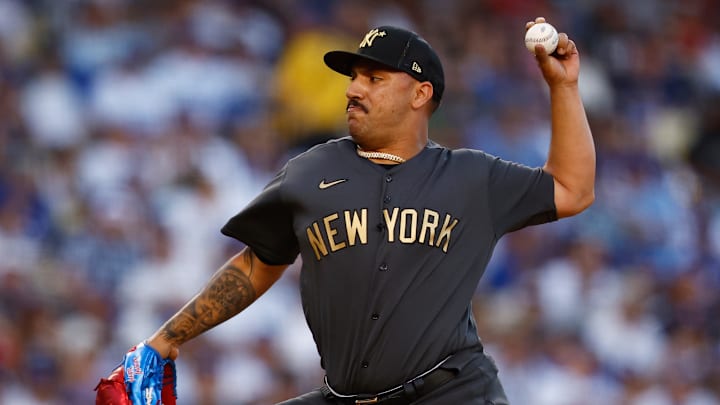It's been a busy couple of weeks for the New York Yankees. First, money-hungry Juan Soto jumps ship to play for their crosstown rivals, the Mets. Then they signed Atlanta Braves ace Max Fried to an eight-year deal. Finally, they traded Nestor Cortes and Caleb Durbin to the Milwaukee Brewers for Devin Williams.
It's a surprising trade because Yankees general manager Brian Cashman has been telling the media that Durbin was in line to be the starting second baseman on Opening Day. But, unsurprisingly, they've moved Cortes, who has been on the trading block since July and sealed his fate after serving up a walk-off grand slam to Freddie Freeman in Game One of the World Series.
Brian Cashman said Caleb Durbin is the current odds-on favorite to be the Yankees' second baseman in 2025.
— Chris Kirschner (@ChrisKirschner) December 10, 2024
This can obviously change depending on what the team adds, but right now, Durbin is the leading candidate. He mentioned Jorbit Vivas and Oswald Peraza could surprise.
What lies ahead for each player included in the deal?
Yankees fans will be sad to see Cortes leave. A 36th-round draft pick in 2013, he emerged, seemingly out of nowhere, eight years later with his trademark mustache and funkified delivery.
Nestor quickly became a fan favorite, with the Yankees hosting t-shirt and bobblehead giveaways with his likeness. Fans would often don Halloween costume mustaches in the stands on days he pitched. In addition to his 'Nasty' moniker, some called him Mario, after the Nintendo character who bears his likeness (thanks partly to a similar mustache).
Relying on both guile and a rising four-seam fastball, Cortes was one of the best pitchers in the league from 2021-2022 until injuries hit in 2023. In 2024, he threw a career-high 174 1/3 innings, but his ERA ballooned to 3.77 (compared to 2.61 over 251.1 innings from 2021-2022). He looked like a pitcher who made easy work of bad teams but struggled against good ones, which isn't ideal for a team like the Yankees with championship aspirations.
On the other hand, Durbin is yet to make his Major League debut but shone on the Triple-A stage in 2024, slashing .287/.396/.471 in 375 plate appearances. If Durbin plays well in spring training, he can win a job at the keystone or the hot corner.
Oliver Dunn at third base is the most vulnerable of the Brewer incumbents. However, their team has enough positional versatility that Durbin could displace Dunn and still end up at second base.
Durbin is a disciplined hitter who walked more than he struck out last year, and he possesses the speed to steal forty bases in the big leagues.
If he can reproduce those numbers for Milwaukee, this trade will be a steal for the Brewers, but it's not a profile that automatically translates; in recent years, we've seen guys with similar profiles like Nick Madrigal, Luis Matos, and Vidal Brujan struggle to convert minor league success into major league production.
The Brewers paid a steep price to acquire Cortes and Durbin. Devin Williams hit the scene and won Rookie of the Year in 2020 when he allowed one earned run in 27 innings, a Major League record for the lowest ERA in a season since 1913 (minimum 21 innings pitched).
He's virtually unhittable with one of the lowest hits allowed per nine innings ratios in baseball history; if he were qualified, his 4.93 H/9 would be first all-time ahead of Nolan Ryans's 6.56 H/9. For good measure, he's also got a career 1.83 ERA in 252.2 innings.
His change-up is the best in the business. He's a modern-day Trevor Hoffman, except instead of a circle change, he has a regular one, and it's nicknamed the 'Airbender,' a homage to Avatar: The Last Airbender.
Ironically, the Yankees traded Cortes, who gave up a backbreaking home run in the World Series, for Williams, who gave up an analogous homer to Pete Alonso in the NL Wild Card Round. However, Williams was tipping his pitches during that appearance, and the Yankees must believe that, given another shot, Williams can be as lights-out in the postseason as he is in the regular season.
After losing Clay Holmes to the Mets, the Yankees filled a need for high-leverage arms in their bullpen by acquiring Williams. Tommy Kahnle and Tim Hill, two important relievers for them last year, are also still swimming in free agent waters, so this move was critical for roster construction.
Williams will depose Luke Weaver from the closer role in the Bronx, and Weaver will return to being a multi-inning fireman in what is shaping up to be one of the best bullpens in the majors.
The Brewers filled a need in their rotation with Nestor Cortes after they lost Frankie Montas to the Mets, and Caleb Durbin is a promising young athletic infielder who can play multiple positions with many years of team control (both Cortes and Williams are free agents after this season).
Williams missed much of last year with a stress fracture in his back, and during that time, Trevor Megill racked up 21 saves for the Brewers; he figures to get the first opportunity to close now that Williams is gone for good. However, they also have a standout minor leaguer named Jacob Misiorowski, who has one of the most electric fastballs in the sport and needs to figure out how to command it. If he doesn't pan out as a starter, he has shutdown closer written all over him.
In all, it's a win-win trade: the Yankees add an elite run-stopper to the back of their bullpen, and the Brewers fill out the middle of their rotation and mitigate the loss of Willy Adames. The Yankees get the best player in the deal, Williams, but the Brewers, acquiring Durbin, can potentially win this trade in the long-run.
